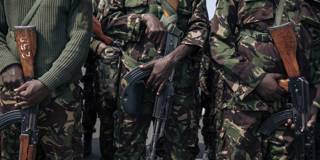ADEKEYE ADEBAJO

Violence is once again surging in Africa’s volatile Great Lakes region. This month marks the 30th anniversary of the Rwandan genocide that left 800,000 people dead and another two million displaced. These refugees fled into the eastern Democratic Republic of the Congo (DRC), which became the epicenter of an increasingly intractable conflict – what some now call Africa’s Thirty Years’ War.
Since the ouster of the kleptocratic dictator Mobutu Sese Seko in 1997, successive DRC governments have been unable to secure the country’s borders and govern large areas in its east, where about six million people have been killed and another seven million internally displaced. The lawlessness of this vast territory has enabled local and foreign-backed forces’ systemic looting – especially in recent years – of the DRC’s large deposits of cobalt, coltan, copper, gold, diamonds, and other minerals.
African regional bodies, external powers, and the United Nations – which has deployed peacekeeping missions in the DRC for 25 years – have failed to curb the violence. To prevent an escalation, and ultimately end the conflict, the DRC’s domestic, regional, and international interlocutors must understand the complex dynamics at work.
At the heart of the current crisis are severe tensions between the DRC and Rwanda, whose autocratic president, Paul Kagame, is expected to extend his almost quarter-century rule in July’s election. Kagame has accused the DRC government of supporting genocidal Hutu militias, seeking to expel Congolese Tutsis, and refusing to negotiate an end to the fighting. The DRC, meanwhile, has rejected talks with the March 23 Movement (M23), a Rwanda-backed rebel group in eastern Congo, and called on Kagame to withdraw Rwandan troops from the DRC and demobilize the M23.
Neighboring Uganda and Burundi have played a more ambiguous role in the conflict. Both are accused (as is Rwanda) of smuggling gold and other resources out of the DRC. But, despite its uneasy truce with Rwanda, the Ugandan government has launched a joint operation with the DRC against the Allied Democratic Forces (ADF), an Islamic extremist group operating in both countries. Burundi has accused Rwanda of supporting Burundian rebels in eastern Congo and recently sent troops to the region under a bilateral agreement with the DRC government.
Exacerbating the dire situation in the mineral-rich eastern provinces of Kivu and Ituri are the widespread human-rights abuses committed by the Congolese army and some Mai-Mai (local self-defense forces) vigilantes. And this is to say nothing of the more than 100 militias that operate in the region. Last year alone, these armed groups displaced one million people. In February, violent clashes broke out as the M23 surrounded the large city of Goma, North Kivu’s capital. The ADF and the Coopérative pour le développement du Congo (CODECO) have reportedly killed hundreds and committed acts of sexual violence.
Peacemaking efforts in the Great Lakes are equally complicated. In 2022, Félix Tshisekedi, the erratic Congolese president, brought in peacekeepers from the East African Community (Burundi, Kenya, South Sudan, Tanzania, and Uganda), of which it is also a member, before criticizing their unwillingness to fight the M23 and engineering their departure. Then, last December, Tshisekedi invited in a Southern African Development Community (SADC) mission – comprising 2,900 troops from Malawi, South Africa, and Tanzania – despite vociferous opposition from Rwanda. But the SADC peacekeepers are unlikely to engage in a full-scale war with Rwanda and the M23, which is what Tshisekedi ultimately wants. Moreover, the recent deaths of two South African soldiers in the DRC has caused alarm among South African policymakers.
Worryingly, the UN peacekeeping mission is set to withdraw from the DRC, at the request of the Congolese government, by the end of 2024. The three African members currently on the UN Security Council – Algeria, Mozambique, and Sierra Leone – are working closely with Guyana to ensure continued financial and logistical support for the SADC mission, while cautioning the UN against leaving a “security vacuum” in the DRC.
Foreign governments are also active in the Great Lakes region. The United States, which was instrumental in halting the M23’s march toward Goma in 2013 by withholding aid from Rwanda, has recently sought to mediate between the DRC and Rwanda. It has also taken a tougher stance toward Rwanda in recent years, suspending military assistance, urging the country to withdraw troops and surface-to-air missiles from the DRC, and condemning its support for the M23. Equally important, the US has questioned Rwanda’s contributions to UN peacekeeping efforts in the Central African Republic and South Sudan, which Rwanda often uses to deflect pressure from its actions in the DRC.
Self-interest has motivated most other foreign powers. Despite partly echoing America’s criticisms, France has increased its financial support for Rwanda, which has deployed 2,500 troops to Mozambique to protect a gas-processing plant owned by French oil giant TotalEnergies from local insurgents. In February, the European Union signed a memorandum of understanding with Rwanda for the exploitation of critical minerals (despite its plundering of the DRC’s resources), incurring the wrath of Congolese officials. China, with which the EU is competing for raw materials, has invested heavily in the DRC’s cobalt sector.
Resolving the Great Lakes crisis will require coordination among regional and external actors. Western countries must condition aid to Rwanda on its withdrawal of troops from the eastern DRC and its ending support for the M23. Rwanda, Uganda, and Burundi should also face severe consequences for the looting and illicit trafficking of the DRC’s minerals. Lastly, Rwanda’s role in UN peacekeeping missions must be scaled down substantially.
Domestically, the DRC must tackle widespread corruption, improve democratic governance, and rein in genocidal forces and Western mercenaries. And the African Union should bridge the gaps in peacemaking efforts, including by bolstering the SADC mission so that it can work more closely with UN peacekeepers. But most importantly, the UN must avoid a hasty, ill-planned withdrawal from what Secretary-General António Guterres has rightly described as “a protracted and largely neglected humanitarian crisis.”
No comments:
Post a Comment